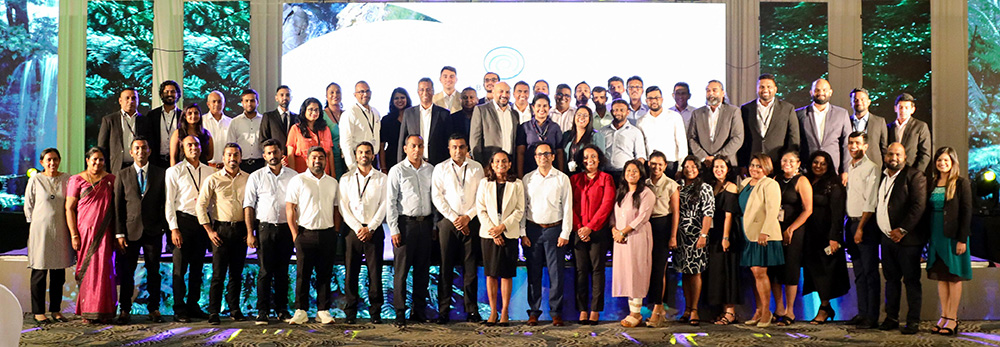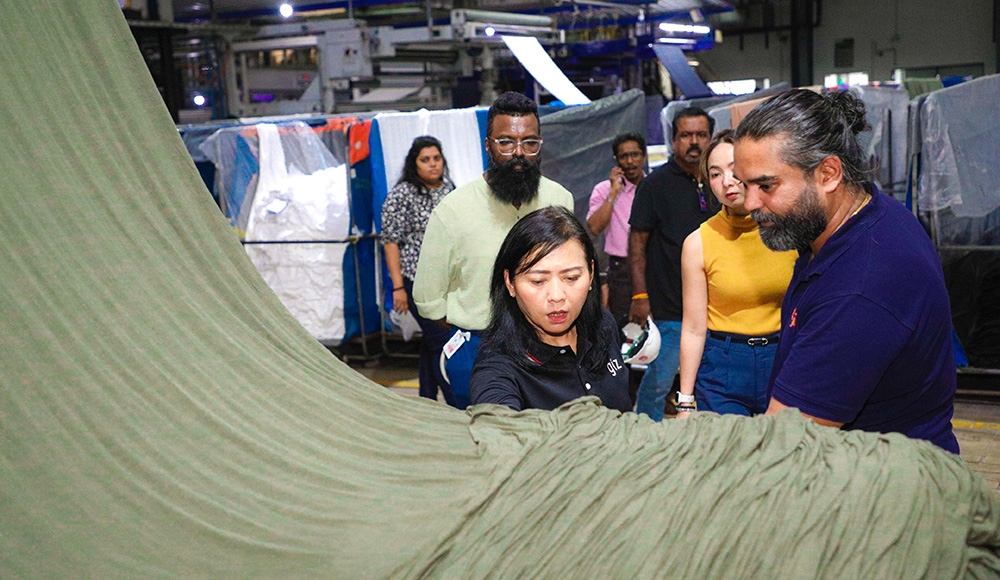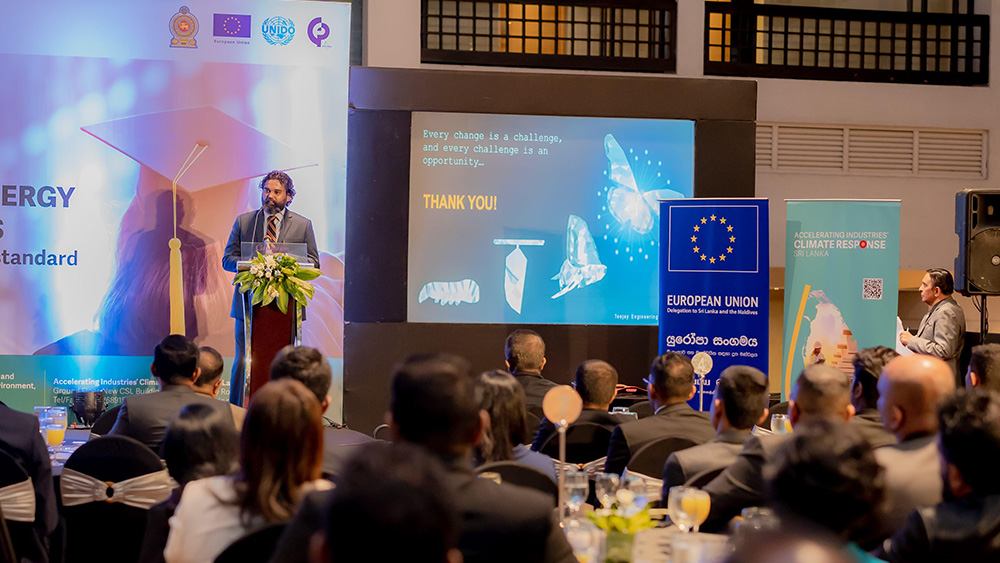
Teejay invited to be Patron of UN Global Compact Network Sri Lanka’s Sustainable Supply Chain & SMEs Working Group
In the heart of Sri Lanka’s manufacturing sector, Teejay Lanka PLC stands as an example of how responsibility can redefine competitiveness. For an industryas far-reaching and complex as textiles, the sustainability of supply chains depends not only on technological innovation but also on collaboration – and Teejay demonstrates how regional manufacturers can lead that change from the Global South.
As such, Teejay Lanka has been invited to be Patron of the Sustainable Supply Chain & SMEs Working Group of the UN Global Compact Network Sri Lanka (Network Sri Lanka). The appointment reflects the company’s deepening alignment with the Ten Principles of the UN Global Compact and its proactive approach to building ethical, transparent, and inclusive supply chains.
“A truly sustainable supply chain doesn’t just move products – it moves people, purpose, and the planet forward,” says Mendaka Hettithanthri, Deputy General Manager – Head of Engineering Teejay Lanka Entities and Head of Sustainability Teejay Group. “At Teejay, we believe transformation begins at the thread.”
Embedding Global Principles in Local Practice
Teejay’s partnership with Network Sri Lanka began in 2022, through engagement with the Diversity & Inclusion Working Group, Climate Ambition Accelerator, and SDG Innovation Accelerator for Young Professionals. These experiences helped strengthen the company’s Environmental, Social, and Governance (ESG) strategy while situating it within a global framework of responsible business conduct.
“The Network has provided us with the tools and perspective to translate global sustainability principles into practical, measurable action,” reflects Hettithanthri. “It has been a platform for shared learning and collaboration – and that sense of collective progress is what truly drives transformation.”
This alignment underpins the company’s long-term sustainability roadmap, Abhivarah 2030, which integrates ethical operations, climate resilience, and circularity across all aspects of its business. Teejay is also among the few textile manufacturers in Sri Lanka to have its emission reduction targets validated by the Science Based Targets initiative (SBTi), reinforcing accountability in managing Scope 1, 2, and 3 emissions. In FY 2024/25, Teejay reported a total GHG inventory of 676 666.38t CO₂ eq, comprising 70 281.58 t CO₂ eq (Scope 1), 37 814.30 t CO₂ eq (Scope 2), and 568 570.49 t CO₂ eq (Scope 3). Scope 3 emissions represent approximately 85 % of the total footprint, highlighting the company’s focus on value-chain accountability. Within Scope 3, the largest contributors are Purchased Goods and Services (258 937 t, 46 %) and Processing of Sold Products (186 588 t, 33%), underscoring raw-material and downstream processing as key leverage points for decarbonization. This quantitative focus positions Teejay as a regional benchmark for science-based climate action aligned with the GHG Protocol and SBTi guidelines.

The company’s next sustainability milestone will include aligning its reporting with IFRS Sustainability Disclosure Standards (S1 and S2) from FY 2024/25 – a testament to its ongoing transparency and commitment to global best practices.
Transparency and Traceability in the Global South
For Teejay, building trust across supply chains begins with traceability. The company uses a multi-platform digital framework – including TextileGenesis, Origin, and SAP HANA integration – to ensure raw materials are tracked from source to finished fabric. This not only meets international buyer expectations but also demonstrates that supply chains in the Global South can be transparent, ethical, and verifiable.
The company’s ongoing QR Traceability Project represents the next step in this journey. Once complete, it will allow brands and customers to scan a unique code on each fabric roll and access real-time data on raw material origin, chemical usage, energy consumption, water intensity, and carbon footprint. The system is being developed to comply with the EU Digital Product Passport (DPP) and Corporate Sustainability Reporting Directive (CSRD), preparing Teejay and its partners for future regulatory requirements.
“Our digital traceability platforms have fundamentally changed how we engage with our buyers,” Hettithanthri explains. “It’s not about compliance for its own sake – it’s about creating a relationship built on evidence and trust.”
This commitment extends across certifications and sourcing standards, including the U.S. Cotton Trust Protocol, Better Cotton Initiative (BCI), Global Organic Textile Standard (GOTS), Global Recycled Standard (GRS), and Eco Label Sri Lanka, all of which reinforce the company’s accountability to ethical and sustainable production.

Circularity and Climate Action at the Core
Sustainability at Teejay is intrinsically operational – embedded into every decision, from the energy powering its dye houses to the handling of textile waste. Through EPR-aligned systems, the company minimizes pre-consumer waste and channels it into reuse streams, including yarn recovery projects that transform offcuts into multi-yarn knitted fabrics for local markets. Even industrial waste, such as plastic barrels, is repurposed into PVC tubes for fabric wrapping, reducing landfill dependency.
In FY 2024/25, Teejay achieved a remarkable 64 % overall waste-diversion rate, reinforcing its strong commitment to circular production and resource efficiency. Of this total, 38% of materials were recycled and 26 % were reused through well-established internal recovery systems, while all hazardous waste was managed through regulated, environmentally sound treatment pathways. These results demonstrate Teejay’s continued progress toward its Abhivarah 2030 vision of “Waste to Wealth” and alignment with global best-practice frameworks such as ISO 59020 Circularity Performance Indicators.
In parallel, Teejay’s water stewardship initiatives include advanced water recycling and salt recovery systems that reclaim significant volumes of process water, reducing dependence on freshwater resources. As a ZDHC Contributor and Bluesign® System Partner, Teejay pre-screens all chemicals, verifies them monthly through InCheck, and ensures compliance with ZDHC MRSL Level 1 to eliminate hazardous substances.
The Group’s average Higg FEM scores for FY 2024/25 were exceptional, Teejay Lanka 99%, Teejay India 97%, and Teejay Prints 91% placing the company among Sri Lanka’s leading performers for energy, water, and chemical management and demonstrating continuous decoupling of production growth from environmental impact.
“We see environmental stewardship as a measure of operational excellence,” Hettithanthri notes. “Our responsibility doesn’t end at the factory gate – it extends to the people and ecosystems connected to our supply chain.”
Driving Change Across the Supply Chain
Teejay’s role as Patron of the Sustainable Supply Chain & SMEs Working Group is grounded in its collaborative approach to supplier engagement. As a regional manufacturer supplying to global brands, the company recognizes its unique position as both a link and a leader within the supply chain ecosystem.
Through supplier ESG risk mapping, joint audits, and capacity-building programmes, Teejay supports partners across all tiers – from yarn producers to dyeing and chemical application suppliers – to align with international sustainability standards. The company’s Teejay Sustainability Summit, first held in 2023, brought together suppliers, brand representatives, NGOs, and government agencies to develop shared pathways for responsible production.
“We act as a bridge between regional suppliers and international buyers,” says Hettithanthri. “Our goal is to turn compliance into collaboration – ensuring that suppliers aren’t just following rules but becoming co-creators of sustainable value.”
This approach aligns with the UN Global Compact’s emphasis on collective impact, particularly in enabling small and medium-sized enterprises (SMEs) to transition toward greener operations. Through vendor training, supplier forums, and knowledge-sharing initiatives under the Working Group, Teejay contributes to building the capacity of SMEs to meet global sustainability benchmarks while enhancing their competitiveness in international markets.
Empowering Communities and SMEs
Beyond its formal supply chain, Teejay extends its sustainability model to local communities. Its Waste to Wealth initiative, conducted in partnership with municipal councils and janitorial worker groups, provides hands-on training in waste segregation while rewarding participation through practical community incentives. Meanwhile, To Earth with Love, featured in Teejay’s annual report, advances biodiversity and ecological restoration through tree planting, river clean-ups, and environmental education for schoolchildren.
These efforts are complemented by Waste Collector Forums and vendor training programmes, which integrate informal sector workers and small vendors into circular economy frameworks. “When SMEs and community partners understand sustainability as an opportunity, not an obligation, they become powerful agents of change,” Hettithanthri reflects.
Collaboration and Progress
Through their role as Patron of the Sustainable Supply Chain & SMEs Working Group, Teejay Lanka works closely with Network Sri Lanka to advance knowledge-sharing, peer learning, and sector-wide alignment. The Network provides the framework for companies to collectively address supply chain challenges – from decarbonization and transparency to human rights and fair labour.
“Our collaboration with Network Sri Lanka helps translate ambition into action,” says Hettithanthri. “Through its Working Groups, we gain access to expertise, dialogue, and shared accountability – that’s what enables meaningful, system-level progress.”
Looking Ahead
As Sri Lanka’s manufacturing sector evolves to meet rising global sustainability expectations, Teejay Lanka’s journey spotlights the importance of embedding responsible practices across every stage of production – and of enabling others to do the same. Its role within the Sustainable Supply Chain & SMEs Working Group illustrates how progress is strengthened when companies invest not only in their own transformation but also in the capacity of their partners, suppliers, and communities.
Through its continued engagement with the UN Global Compact Network Sri Lanka, Teejay contributes to advancing the Ten Principles of the UN Global Compact and the Sustainable Development Goals (SDGs) – weaving transparency, equity, and collaboration into the fabric of Sri Lanka’s sustainable industrial future.
